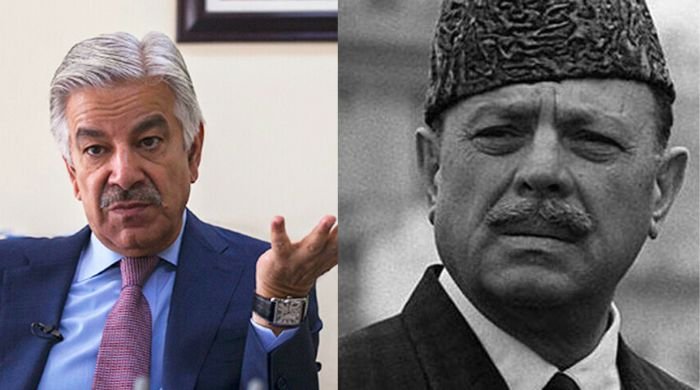Ayub Khan’s body should be exhumed and hanged, says Khawaja Asif.
The National Assembly of Pakistan witnessed heightened tensions as Defence Minister Khawaja Muhammad Asif and Opposition Leader Omar Ayub engaged in a heated exchange regarding accountability and recent episodes of violence in the country.
The dialogue reflects the deep-rooted political divisions and demands for justice within Pakistan’s democratic framework.
Defence Minister Calls for Accountability:
During the session, Defence Minister Khawaja Muhammad Asif stirred controversy by suggesting the exhumation and hanging of the body of Field Marshal Ayub Khan, the former military dictator who imposed the country’s first martial law.
Asif invoked Article 6 of the Constitution, urging for proceedings against those who have violated the nation’s supreme law.
خواجہ محمد آصف کی تقریر پر تحریک انصاف کے ممبران تڑپ اٹھے
آرٹیکل 6 ضرور لگائیں لیکن جس طرح اولیور کرومویل کی ہڈیوں کو قبر سے نکال کر پھانسی دی گئی تھی، ویسے ہی 1958 میں جعلی فیلڈ مارشل ایوب خان کو قبر سے نکال کر پھانسی لگائیں اس پر آرٹیکل 6 لگائیں اور 2022 میں اسپیکر کی کرسی پر… pic.twitter.com/QNqGjJ5zaM
— Team Khawaja Asif (@Team_KhawajaMA) May 13, 2024
“Article 6 proceedings should be also held against those who violated the Constitution, dissolved the assembly and do not let pass the no-confidence motion,” he said
He emphasized that accountability should begin with Ayub Khan, highlighting the need for consistency in upholding constitutional principles.
Opposition Leader Responds:
In response to Asif’s remarks, Opposition Leader Omar Ayub vehemently rejected allegations of his party’s involvement in the recent May 9 riots.
He reiterated the Pakistan Tehreek-e-Insaf (PTI) party’s demand for the constitution of a judicial commission to investigate the incidents, which he claimed were staged to target PTI founder Imran Khan.
Ayub emphasized the importance of an impartial investigation to uncover the truth behind the violence and address any underlying grievances.
Economic Toll of Political Instability:
Ayub further underscored the economic repercussions of past episodes of violence, citing the aftermath of former Prime Minister Benazir Bhutto’s assassination in 2007.
Also read: Who killed Benazir Bhutto?
“The violence that broke out in the country following Benazir’s assassination resulted in $2 billion in losses,” he added.
He highlighted the significant financial losses incurred due to widespread protests and damage to infrastructure, including railways and public property.
“Karachi alone suffered damages worth Rs80 to Rs90 billion in three to four days,” he added.
Ayub’s remarks shed light on the broader impact of political instability on Pakistan’s economy and the urgent need for stability and security to foster economic growth.
Challenges to Democratic Institutions:
The exchanges in the National Assembly reflect the challenges facing Pakistan’s democratic institutions as they navigate issues of accountability, governance, and political stability.
As the country grapples with ongoing political tensions, the role of democratic institutions in fostering dialogue and reconciliation becomes increasingly crucial.
